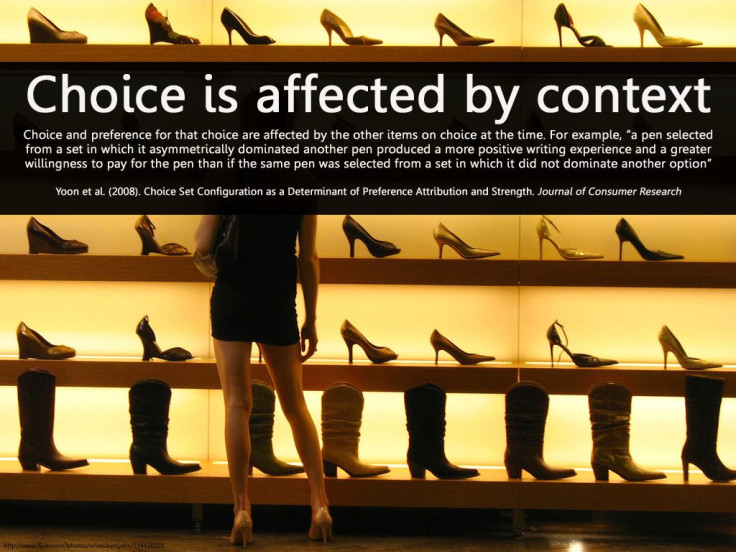Most 'Irrational' Choices Are Actually Logical, When You Look At The Bigger Picture

A new study shows that seemingly irrational choices made by people often make sense when viewed through a larger lens of natural selection. The work builds on previous research showing that choice is very much influenced by context within a marketplace selling ideas, shoes, financial derivatives, and even romantic partners.
To be sure, the world comes fully stocked with people irrational in mind and temperament, to one degree or another. Acknowledging the frailty of humankind, Socrates said true knowledge comes from the mind, which may be tricked by senses overwhelmed by emotion. Contaminated by feeling, the thinking man finds himself mentally hobbled by this combination of mind and body, the human being. Without philosophy, he is lost.
John McNamara, a professor at the University of Bristol’s School of Mathematics in the UK, works with researchers seeking to understand the mechanics of the mind from an evolutionary perspective, assessing how the process helps the individual within the larger context. The study finds that individual choices between one and another are often influenced by other seemingly irrelevant options.
A real estate investor considering a choice of two rental properties, for example, might initially prefer one house, House A, over House B. Following, the same individual might prefer House B in a second choice between that property and House C. Yet the buyer might rationally prefer House C over House A in a direct choice, even though the assessment appears to make no sense based on a quick mental calculation. Thus, the rational thought here supersedes the transitive law, proving more complex.
“I foresaw that inferior options could affect choices, but the finding of intransitive choice is most exciting,” McNamara said in an email to Medical Daily, adding that previous work on the topic relied on the changing state of the individual, whereas this experiment applies more generally to the human mind.
Aside from the realtor analogy, McNamara and his colleagues apply the theory in the animal world more broadly by considering how a predator assesses his options of prey, given varying resource costs — time spent on the hunt, along with degree of difficulty.
“It has been shown that transitivity and independence of irrelevant alternatives are violated by many species of the natural world, such as honey bees, hummingbirds and human beings,” McNamara said. “The effects have even been shown in organisms as small as ants and as weird as slime moulds. So it's certainly not just a human-based financial thing.”
McNamara said the study shows that two main principles of rationality, regularity, and transitivity, cannot be applied easily to an individual choice at one time. “Knowing that an individual prefers an orange to a banana, and that they prefer a banana to an apple tells us nothing about which they 'should' prefer from an orange and an apple, because each fruit has a different handling time,”he said.
Although seemingly irrational, individual choices often prove the work of a rational mind in aggregate, over time.
Source: McNamara JM, Trimmer PC, Houston A. Natural Selection Can Favour ‘Irrational’ Behaviour. Biology Letters. 2014.



























